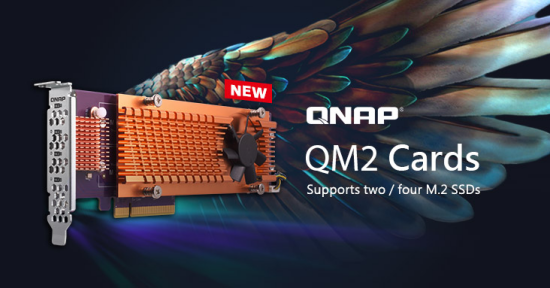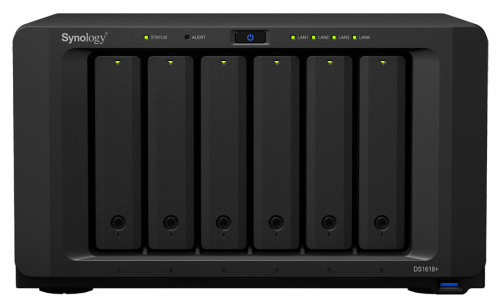- Details
- Network Storage
QNAP Systems, Inc. has extended the lineup of QM2 PCIe expansion cards with new models that support up to four M.2 SSDs slots on a single card. QM2 cards support either M.2 SATA SSDs or M.2 PCIe NVMe SSDs to enable SSD caching for boosted IOPS performance or to form an auto-tiering volume for optimal storage performance. QM2 cards also allow QNAP NAS users to maximize both storage capacity and performance by installing M.2 SSDs without occupying any 3.5-inch drive bays.

“When faced with a performance bottleneck, the random read/write speed of the hard drives in a NAS is one of the decisive performance factors,” said Joan Hsieh, Product Manager of QNAP, continuing “QM2 cards can greatly boost the performance of QNAP NAS with PCIe slots, while the flexible configuration of SSD caching and I/O-aware Qtier all helps multiply NAS performance.”
Add a comment- Details
- Flash Memory
Toshiba Memory Corporation (TMC) today announced that it decided to start construction of a new state-of-the-art fab for BiCS FLASH, its proprietary 3D flash memory, in Kitakami, Iwate prefecture in July this year.
TMC has selected Kitakami City as the next location to expand its operations in September last year, and has started preparations for construction of the new fab. Demand for 3D flash memory is increasing significantly on fast growing demand for enterprise SSD for datacenters and servers. TMC expects continued strong growth in the mid and long term, and the timing of its construction positions it to capture this growth and expand its business.
The new fab will be completed in 2019, and will have a quake absorbing structure and an environmentally friendly design that includes the latest energy saving manufacturing equipment. It will also introduce an advanced production system that uses artificial intelligence (AI) to boost productivity. Decisions on the new fab’s equipment investment, production capacity and production plan will reflect market trends. TMC expects to continue its joint venture investments based on discussion with Western Digital in the new facility.
Add a comment- Details
- Flash Memory
Micron Technology, Inc. and Intel Corporation today announced production and shipment of the industry's first 4bits/cell 3D NAND technology. Leveraging a proven 64-layer structure, the new 4bits/cell NAND technology achieves 1 terabit (Tb) density per die, the world's highest-density flash memory.
The companies also announced development progress on the third-generation 96-tier 3D NAND structure, providing a 50 percent increase in layers. These advancements in the cell structure continue the companies' leadership in producing the world's highest Gb/mm2 areal density.
Both NAND technology advancements—the 64-layer QLC and 96-layer TLC technologies —utilize CMOS under the array (CuA) technology to reduce die sizes and deliver improved performance when compared to competitive approaches. By leveraging four planes vs the competitors' two planes, the new Intel and Micron NAND flash memory can write and read more cells in parallel, which delivers faster throughput and higher bandwidth at the system level.
The new 64-layer 4bits/cell NAND technology enables denser storage in a smaller space, bringing significant cost savings for read-intensive cloud workloads. It is also well-suited for consumer and client computing applications, providing cost-optimized storage solutions.
Add a comment- Details
- Flash Memory
Micron Technology, Inc. has commenced shipments of the industry's first SSD built on revolutionary quad-level cell (QLC) NAND technology. Unveiled at Micron's 2018 Analyst and Investor Event, the Micron 5210 ION SSD provides 33 percent more bit density than triple-level cell (TLC) NAND, addressing segments previously serviced with hard disk drives (HDDs). The introduction of new QLC-based SSDs positions Micron as a leader in providing higher capacity at lower costs to address the read-intensive yet performance-sensitive cloud storage needs of AI, big data, business intelligence, content delivery and database systems.

As workloads evolve to meet the ever-increasing demands for real-time data insights and analytics, data centers increasingly need the capacity, speed, reliability and steady state performance that enterprise flash storage provides. Micron QLC NAND — reaching densities of 1 terabit with its next-generation 64-layer 3D NAND structure — is optimized to meet these demands and make SATA SSD performance and capacity more approachable than ever before.
Add a comment- Details
- Flash Memory
ADATA Technology, a leading manufacturer of high-performance DRAM modules and NAND flash products, today launched the industrial-grade ADATA IM2P33F8 PCIe Gen3x4 and IM2S3168 SATA 6Gbps M.2 2280 solid state drives. Both drives employ durable and long-lasting 3D NAND flash for extended longevity and improved power efficiency compared to 2D NAND, and are ideal upgrade options for a wide range of systems and installations.

IM2P33F8 PCIe Gen3x4 – An Excellent Alternative to SATA SSDs
With a price tag comparable to SATA SSDs, the IM2P33F8 is an excellent alternative for upgrading a range of systems and installations, from laptops to surveillance systems. Utilizing 3D NAND flash it provides read/write performance of up to 2050/1600MB per second, as well as amazing reliability, durability, and stability. It supports Host Memory Buffer (HMB) technology, enabling it to enhance random read/write performance. For upholding data integrity and safety, the IM2P33F8 supports End-to-End (E2E) Data Protection to keep data consistent along the entire data transfer path, while support for RAID Engine reduces the risk of data loss due to drive failure. IM2P33F8 is available in capacities ranging from 128GB to 512GB, and features a slim single-sided design for high compatibility.
- Details
- Network Storage
Synology Inc. today launched DiskStation DS1618+, a 6-bay NAS featuring the Intel Atom C3538. For tech enthusiasts and small to medium sized businesses, DS1618+ is the perfect all-in-one solution for file serving, application hosting, data backup, and real-time collaboration — all aided by its exceptional performance.

DS1618+ is powered by a quad-core Intel Atom processor C3538 and 4GB DDR4 non-ECC SODIMM, expandable up to 32 GB in ECC SODIMMs. The storage capacity can be upgraded to 192TB when connected to two DX517 expansion units, providing fast-growing companies a data storage solution that scales with their business.
Add a comment- Details
- Network Storage
QNAP Systems, Inc. today released the new enterprise-class TS-1677X Ryzen NAS with twelve 3.5-inch drive bays, four 2.5-inch drive bays, and driven by the absolute performance of an AMD Ryzen 8-core processor, optimized storage efficiency with Qtier auto-tiering, and SSD caching. The AMD Ryzen processor, with Turbo Core of up to 3.7 GHz, can greatly boost virtualization performance. The TS-1677X can also perform as AI-oriented big data storage when used with a high-end graphics card and QNAP's “QuAI” AI developer package.

The TS-1677X includes models with AMD Ryzen 7 1700 (8-cores/16-threads), AMD Ryzen 5 1600 (6-cores/12-threads) and AMD Ryzen 3 1200 (4-cores/4-threads) that support AES-NI encryption acceleration and up to 64 GB DDR4 RAM. Every model provides two 10GBASE-T RJ45 ports (that support 10G/5G/2.5G/1G/100M speeds) and three PCIe slots for incredible expansion potential. Supported PCIe devices include a graphics card, 10GbE/40GbE NICs, USB 3.1 expansion cards, and QM2 cards (that add additional M.2 SSDs or 10GbE connectivity). Incorporating incredible performance, reliability and scalability, the TS-1677X provides an exceptional storage solution for diverse business IT environments.
Add a comment- Details
- Network Storage
QNAP Systems, Inc. today released the new TS-832X 8-bay quad-core NAS with two built-in 10GbE SFP ports, providing users with a budget-friendly, high-speed network storage solution. It is also an ARM-based NAS that supports Qtier™ technology for auto-tiering, and its PCIe slots allow for the installation of peripheral cards like 10GbE NICs, QM2 cards, USB 3.1 10Gbps expansion cards, or wireless network cards to enhance the NAS with greater application potential.

“The TS-832X is a step up from the TS-831X, featuring an advanced 64-bit Cortex®-A57 processor and DDR4 memory while also delivering computing power of 32K DMIPS to benefit performance upgrade by 40%,” said Dan Lin, Product Manager of QNAP, continuing “Coupled with the 10GbE connectivity and PCIe expandability, it provides a highly cost-efficient private cloud NAS solution.”
Add a comment- Details
- Flash Memory
GIGABYTE TECHNOLOGY Co. Ltd, a leading manufacturer of motherboards and graphics cards, presents its UD PRO series SATA Interface SSDs with built-in DDR3 RAM, adhering to GIGABYTE standards for high quality, ultra durable products and providing users with a superior product experience.

Newly introduced GIGABYTE UD PRO series SSDs include both 256GB and 512GB capacity options and come with a clean, sleek design featuring a black and gray exterior with the product name engraved in white. Not only they do utilize high quality 3D NAND Flash memory, they also come with a high-speed, low power DDR3L buffer cache to accelerate the read/write speeds of the SSD, fulfilling the GIGABYTE standard for high quality products.
Add a comment- Details
- Optical Storage
Taiwan recordable optical disc leading company, Ritek Co. announced today, it has become the current only one oversea Archive Disc professional production partner that outside Panasonic group. Such mass production of 300GB Archive Disc (AD) will be started in July. It has also become the first professional optical disc manufacturer in the world to have AD production lines and technologies, besides the two specification developers of AD. It is officially moving toward the highest field of B2B professional market, which commencing the production of large-capacity AD archive discs.
The Archive Disc is a new generation of optical discs jointly developed by Panasonic and Sony, and was designed for large-scale cloud databases. Panasonic and Sony have the most high-end optical disc and optical disc drive technology, invested huge technology development resources, have formulated "Archival Disc", a new standard for professional-use, next-generation optical discs. Both companies started co-development in July 2013 and completed a standard with recording capacity of 300GB per disc by the end of 2015, of which had constituted extraordinary contribution. At present, specification of 300GB has been developed and plan to develop up to 1TB in the future according to Press Release from both companies.
Data (cloud) centers require safe and secure data storage for decades. AD archive disc is write-once storage media, and can effectively prevent hackers from overwriting and forfeiting data. According to accelerated testing, the mean lifetime of Panasonic Archival Disc is estimated to be 100 years or more at temperatures of 30ºC and humidity of 70% RH. Compared to conventional media that have to migrate data periodically, long-life AD archive discs without data transfer costs. The special features can make the archiving operation Panasonic AD system at room temperature, it also significantly reduce the electricity cost of data center facilities for temperature control.
Add a comment
